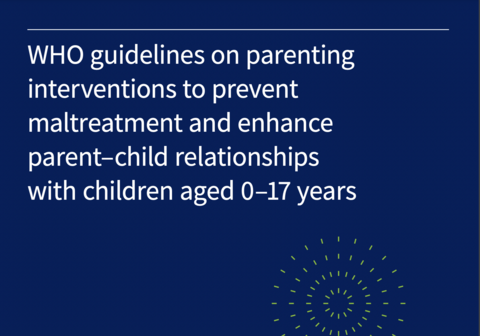This guideline provides evidence-based recommendations on parenting interventions for parents and caregivers of children aged 0–17 years that are designed to reduce child maltreatment and harsh parenting, enhance the parent–child relationship, and prevent poor mental health among parents and emotional and behavioural problems among children.
Background:
Child maltreatment is a global public health problem. It can have detrimental and long-lasting effects on the development and health of children. Preventing child maltreatment has the potential to ensure that hundreds of millions of children can grow up free from exposure to violence and its negative consequences at individual, family, and societal levels. Child maltreatment occurs most frequently in the home at the hands of parents and other caregivers, although it is also prevalent in other settings such as schools and orphanages where children are subject to adult authority. Parenting interventions strengthen the quality of parent–child relationships and help parents and caregivers develop alternatives to violent disciplining.
Purpose of the guideline:
This guideline provides evidence-based recommendations on parenting interventions for parents and caregivers of children aged 0–17 years that are designed to reduce child maltreatment and harsh parenting, enhance the parent–child relationship, and prevent poor mental health among parents and emotional and behavioural problems among children.
Target audience:
The guideline is directed at: • Relevant government personnel involved in either establishing parenting programmes or approving the implementation of these by non-state actors. This can include personnel responsible for providing normative guidance and training for programme delivery at the national level, and personnel working at subnational levels (e.g. provincial or municipal). • Donors, project developers, programme managers and outcome evaluators from nongovernmental organizations (NGOs), faith-based organizations, and bilateral and multilateral development assistance agencies.
Guideline development methodology:
The recommendations in this guideline were developed using procedures outlined in the WHO handbook for guideline development (1). The steps in this process include (i) identifying key questions and outcomes; (ii) retrieving evidence; (iii) assessing and synthesizing evidence; (iv) formulating recommendations, including research priorities; and planning for (v) dissemination; (vi) implementation, equity and ethical considerations; and (vii) impact evaluation and updating of the guideline. The GRADE methodology (2) was followed to prepare evidence profiles related to preselected topics, based on up-to-date systematic reviews and mixedmethods reviews assessing INTEGRATE criteria (3). The scoping of the guideline and the prioritization of outcomes were carried out by the Guideline Development Group (GDG) in a virtual meeting on 14– 17 July 2020. The development and finalization of the evidence-informed recommendations were conducted by the GDG in a virtual meeting on 28–30 March 2022.

